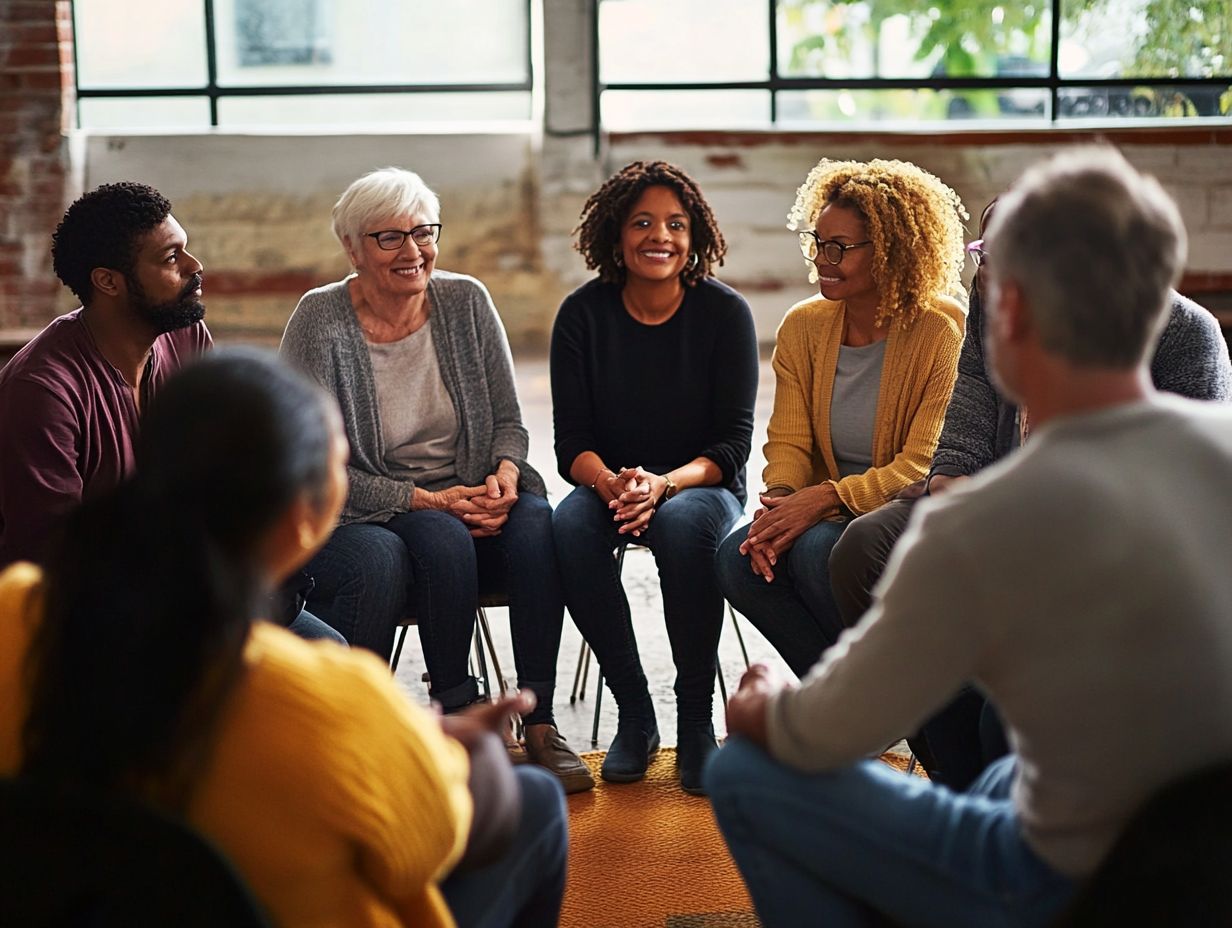Peer support plays a crucial role in the cancer journey and cancer diagnosis, offering emotional and psychological assistance through shared experiences. It connects cancer patients and survivors, enabling them to share coping strategies and reduce feelings of isolation.
Within cancer care, peer support groups and volunteer peer partners provide a platform for individuals to offer empathy, encouragement, and practical advice, ultimately enhancing psychosocial outcomes and quality of life.
The importance of peer support lies in its ability to improve mental health by reducing anxiety and depressive symptoms through understanding and shared experiences. This form of support fosters resilience, psychological empowerment, and personal growth, significantly enhancing the quality of life during treatment and survivorship.
Patients can access peer support both online and in-person, allowing flexibility and accessibility based on personal preferences and circumstances. Effective communication and self-care practices further enhance the benefits of peer support, ensuring it is both supportive and sustainable. Online support and telephone support are viable options for those unable to attend in-person meetings.
Key Takeaways:
Understanding Peer Support

Peer support involves individuals sharing personal experiences to provide emotional and psychological support, and it is integral to patient-centered care.
In the context of cancer, peer support connects patients and survivors to share coping strategies and support each other, forming a robust support network.
Peer support enhances psychosocial outcomes, psychological empowerment, and quality of life.
What is Peer Support?
Peer support is the process of individuals with similar experiences, such as cancer, providing emotional and practical assistance to each other, enhancing psychosocial care.
In cancer care, peer support involves sharing experiences and coping strategies to enhance psychological enablement, patient involvement, and reduce isolation.
The Role of Peer Support in Cancer
The role of peer support in cancer involves providing emotional comfort and practical advice from individuals with similar experiences, fostering social support and emotional relief.
Peer support improves psychological well-being by offering understanding, reducing feelings of isolation, and sharing coping strategies during the cancer journey. It also facilitates effective patient interactions and emotional relief.
In cancer care, peer support groups help patients connect with others facing similar challenges, facilitating shared experiences and mutual support, and contributing to a comprehensive support network.
Emotional Support and Coping
Emotional support in peer support involves providing a safe space for sharing emotions and offering coping strategies during challenging situations like the cancer journey. This includes interventional design and patient-reported outcomes evaluations to ensure effectiveness.
Emotional support works through active listening and empathy, helping individuals feel understood and less isolated. Peer partners play a crucial role in this process.
Coping strategies derived from emotional support foster resilience and improve psychological well-being by enhancing connection and personal growth. These strategies are often shared through one-on-one support and group interactions.
Practical Support and Resources
Practical support in peer programs includes resource sharing, providing educational materials, and information from community organizations for cancer patients. This can involve connections with Cancer Hope Network and other cancer community resources.
This support connects individuals to resources like telephone hotlines and online forums, offering emotional support and practical advice. It also includes virtual training for effective use of these platforms.
These interactions help alleviate isolation and promote mental well-being during treatment, ensuring comprehensive psychosocial support.
Benefits of Peer Support for Cancer Patients

Peer support for cancer patients provides emotional support, shared experiences, and a sense of community. It also fosters stress relief and patient advocacy within the healthcare system.
Benefits include reduced anxiety, increased coping skills, and improved emotional well-being, which are corroborated by various studies on peer support in cancer care.
Peer support groups help cancer patients feel less isolated and more understood by connecting patients with others facing similar challenges. These groups often include cancer survivors offering insights from their own experiences with cancer treatments.
Improved Mental Health
Improved mental health is a key benefit of peer support for cancer patients by providing emotional support and reducing isolation. These benefits are often highlighted in randomized-controlled trials assessing peer support interventions.
Peer support connects individuals with similar experiences, which helps alleviate anxiety and depressive symptoms. This connection is vital in enhancing psychosocial outcomes.
Sharing coping strategies and emotional experiences in a supportive environment fosters resilience and validates experiences. This process is an essential part of personalized approaches to patient care.
This connection enhances overall quality of life during treatment and is a significant aspect of psychosocial care.
Enhanced Quality of Life
Enhanced quality of life refers to improvements in well-being, mental health, and physical health, often achieved through supportive relationships and community engagement. Community support plays a crucial role in this process.
In cancer survivorship, peer support enhances quality of life by reducing isolation, lowering anxiety, and sharing coping strategies. Integrating these strategies can significantly impact patient-reported outcomes.
Peer support helps survivors manage treatment effects and encourages active lifestyles. This support can be particularly beneficial for those dealing with specific cancers such as breast cancer or prostate cancer.
How to Find and Join a Peer Support Group
To find and join a peer support group, start by searching online resources like cancer community websites or forums for support group listings. The American Cancer Society and other organizations like Cancer Hope Network can provide valuable recommendations.
Check local hospitals or cancer treatment centers for in-person group meetings. These institutions often collaborate with community organizations to offer comprehensive support.
Contact organizations such as the American Cancer Society for recommendations on support groups in your area. They provide detailed information on available peer support options.
Once a suitable group is identified, follow their joining instructions, which may include registration via an online form or attending an introductory meeting. Participation in virtual training may also be required to ensure compliance with the group’s guidelines.
Online and In-Person Options
Online and in-person options for peer support provide flexibility and accessibility for individuals within the cancer community. These options ensure that patient needs are met regardless of their circumstances.
Online peer support allows participation from home, beneficial for those with mobility issues or in remote areas, and offers anonymity, fostering openness. It also facilitates information sharing and health information dissemination.
In-person support groups provide face-to-face interaction, enhancing emotional bonding but may require travel and fixed schedules. These in-person sessions are crucial for fostering deep emotional support and community engagement.
Both online and in-person peer support options enrich patients’ lives based on personal circumstances and preferences. Integrating these options into the healthcare system can enhance overall patient care.
Tips for Getting the Most out of Peer Support

To get the most out of peer support, focus on clear communication by actively listening and providing honest feedback. Engaging in training programs can improve these communication skills.
Establish healthy boundaries by defining your limits and respecting others’ limits. This practice ensures healthy patient interactions and mutual respect.
Integrate self-care by scheduling regular breaks and reflecting on shared experiences. Self-care practices like mindfulness and meditation are crucial for maintaining balance.
Peer support is more effective when participants engage openly and maintain mutual respect. Emotional support networks facilitate this mutual engagement.
Communication and Boundaries
Effective communication and setting boundaries in peer support ensure emotional support is beneficial and respects personal limits. Patient advocacy is crucial in maintaining these standards.
Communication fosters open dialogue and mutual respect, allowing individuals to express needs and feel validated. Training requirements ensure that these communication skills are consistently applied.
Boundaries prevent misunderstandings and emotional fatigue, maintaining a healthy dynamic in peer support relationships. Group interactions can be structured to respect these boundaries.
Self-Care Practices
Self-care practices are activities individuals engage in to maintain physical, emotional, and mental well-being. These practices are essential for managing the stress associated with cancer treatments.
Self-care practices for cancer patients include:
- Mindfulness
- Meditation
- Regular physical activity
- Balanced nutrition
Creative outlets like art and music therapy, along with relaxation techniques such as deep breathing and yoga, contribute to emotional resilience. These activities support stress relief and overall well-being.
Self-care enhances personal healing and strengthens peer support networks. It also plays a critical role in the broader context of psychosocial support and patient-centered care.
Frequently Asked Questions
What is peer support in cancer?
Peer support in cancer refers to the emotional, practical, and informational assistance provided by individuals who have gone through a similar cancer experience. It involves sharing personal experiences, offering encouragement and empathy, and providing helpful resources. Peer support is a cornerstone of psychosocial care and quality assessment in cancer treatment.
How does peer support benefit cancer patients?

Peer support can provide a sense of understanding and connection, reduce feelings of isolation, and improve overall well-being for cancer patients. It can also help patients cope with treatment side effects, make informed decisions, and feel more empowered in their cancer journey. Engaging with trained volunteers in these programs is often beneficial.
Is peer support only for cancer patients?
No, peer support is also beneficial for caregivers and loved ones of cancer patients. They can receive emotional support, practical advice, and learn coping strategies from peers who have been in a similar role. This support is vital for the entire cancer community.
How can I find peer support for cancer?
There are various ways to find peer support for cancer, such as joining support groups, participating in online forums, connecting with local organizations, or asking your healthcare team for recommendations. You can also reach out to cancer survivors or caregivers in your personal network. Cancer centers often provide information on available support programs.
Is peer support a substitute for professional therapy?
No, peer support should not replace professional therapy or counseling. It is meant to complement medical treatment and offer additional support from individuals who have firsthand experience with cancer. If you are struggling with your mental health, it is important to seek help from a qualified therapist or counselor. Peer support can be part of a comprehensive psychosocial support plan.
Can I provide peer support to others while still going through my own cancer journey?
Yes, as a cancer patient you can still offer peer support to others. It may even be therapeutic for you to share your experiences and offer encouragement to others. Just make sure to prioritize your own well-being and seek support when needed. Engaging in a peer support program can provide structure and resources to help you effectively support others.


